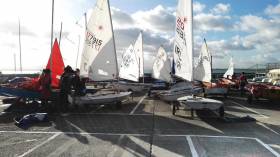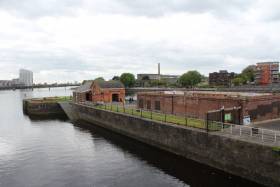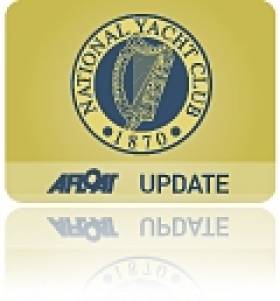Displaying items by tag: Sports Capital Programme
High Fees Could Mean Exclusion From Future Rounds Of State Sports Grants
New rules for sports grants introduced after a controversy involving private schools two years ago could affect eligibility for yachts clubs in the future, it is feared.
Ten sports clubs across the country — two private schools and eight golf clubs — were excluded from receiving State funding under the Sports Capital Programme, it’s been reported in The Irish Times, which has much more on the story.
It follows a rule change which means clubs or schools with a one-off entrance fee of over €1,500 or an annual fee of €1,500 or more are “excluded from receiving a grant offer”.
A briefing from the Department of Transport, Tourism and Sport said the new grant allocation rules were enacted to “ensure that as much money as possible goes to the most deserving organisations”.
A department spokesperson confirmed that such changes will be under review, along with all other aspects of the grant scheme annually, ahead of next year’s round of funding allocations.
No yacht clubs were denied under this year’s amendments, but there are concerns that some Dublin clubs could fall foul of these new measures in future.
Sutton, Royal Cork & Others Benefit From €37M In Grants To Sports Capital Projects
Sutton Dinghy Club received the biggest amount out of four local allocations for sailing as the 2018 round of the Sports Capital Programme is completed.
The north Co Dublin club was awarded €55,971 towards the upgrade of its clubhouse facilities and slipway, out of a total of €37 million for local projects announced last Friday (15 November) by the Department of Transport, Tourism and Sport (DTTAS).
Elsewhere, Royal Cork Yacht Club receives €38,051 towards its plans for new universal access to sailing at its marina, while Inniscarra Sailing and Kayaking Club was allocated €9,062 for sports equipment and improvement of facilities.
And Killaloe Sailing Club in Co Clare was granted €28,158 towards new facilities and a new club RIB.
There was also a single allocation for rowing, as Courtmacsherry Rowing Club was awarded €82,802 towards the first phase of its new clubhouse plans.
The Sports Capital Programme (SCP) is the primary means of providing Government funding for capital projects to sport and community organisations at local, regional and national level. According to the DTTAS, the 2018 round of the SCP saw the highest level of interest ever with 2,337 individual applications received.
New Round Of Funding For Corrected Sports Capital Programme Submissions
Four aquatic sports-related projects will share in the €7 million in grants announced under the Sports Capital Programme (SCP) for schemes previously deemed invalid in 2017 but since corrected.
In Cork, Lee Valley Rowing Club will receive €12,000 for the purchase of rowing boats and oars, while Fingal Rowing Club in north Co Dublin will get €23,000 under is boat and equipment application.
Equipment for junior sailing will get a grant of €18,500 towards its purchase at Dundalk & Carlingford Sailing Club in Co Louth, and Limerick Boat Club’s re-roofing project receives the biggest sum of his cohort of €37,400.
“The Sports Capital Programme remains an essential vehicle for providing suitable sports facilities and equipment to allow as many people participate in sport as possible,” said Sport Minister Shane Ross.
“The grants which we have approved [on Thursday 17 January] will benefit every county and 23 different sports will see improved facilities and equipment. I look forward to announcing grants to many more deserving sports projects later in the year.”
Minister of State Brendan Griffin added: “Since being appointed minister with responsibility for sport, I have had the pleasure of seeing the huge difference that the Sports Capital Programme has made throughout the country.
“I commend the volunteers behind the clubs and groups receiving grants today. They are the lifeblood of sports in Ireland and providing them with the right facilities and equipment is the least we can do to assist them in their roles as coaches, mentors or grounds keepers.”
Under the 2018 SCP, for the first time, applicants who were invalid under the previous round were invited to correct their applications rather than having to make completely fresh applications.
A total of 186 groups took up this opportunity and over 90% of these groups are now getting a grant.
The full list of grants is available on the DTTAS website, as is the list of successful corrected applications for 2018.
Watersport Benefits In 2017 Sports Capital Regional Allocations
#Watersport - Canoeing, rowing, angling and waterskiing are beneficiaries in regional allocations under the 2017 Sports Capital Programme.
Sport Minister Shane Ross and Minister of State for Sport Brendan Griffin announced €4m in allocations for regional projects yesterday (Thursday 21 December), in addition to the €56m grants for local projects announced last month.
“To achieve our objective of getting as many people participating in sport as possible and to ensure that our sports stars can compete at the highest level, we need to have the appropriate facilities in place,” said Minister Ross.
Among aquatic sports, canoeing was a major beneficiary of this year’s regional allocations, with Canoeing Ireland receiving three separate grants.
A sum of €13,500 has been allocated to develop a Dublin canoeing programme, while €21,500 will go towards a canoe polo programme in the capital, and €4,000 will fund the development of wild water racing in the city.
Rowing Ireland receives the biggest share of watersport awards, €66,500 for a floating launch house and pontoon in Cork.
Golden Falls Water Ski Club will get €30,500 for the development of a regional water skiing facility in Kildare.
In other awards, the Dublin-based Irish Waterski & Wakeboard Federation gets €17,500 for boat and wakeboard obstacles, and the Munster Regional Trout Angling Council has netted €2,000 for angling training and the purchase of safety equipment.
As previously reported on Afloat.ie, Irish Sailing is encouraging the nation’s yacht and boat clubs to try to keep their share of €1.1 million in local Sports Capital grants within Ireland.
Sailing, Paddling, Diving Clubs & More Share In Latest Sport Capital Programme Allocation
#SportsCapital - Sailing, paddling and diving clubs across 20 counties will share in the latest €35 million allocation to local projects under the Sports Capital Programme.
Among the biggest beneficiaries under the latest grants are Cullaun Sailing Club in Co Clare, which receives €105,000; Cork's Phoenix Kayak Club and Skibbereen Rowing Club, getting €120,000 and €100,000 respectively; Waterford Harbour Sailing Club's €75,000 grant; and €80,000 for Wexford Harbour Boat and Tennis Club.
Dublin and Cork counties also boast the largest share of individual allocations, with 17 and 15 respectively.
Speaking at yesterday's launch, Minister for Sport Michael Ring said: "The Sports Capital Programme ensures that as many clubs and organisations as possible have the facilities and equipment they need to allow the maximum number of people to get involved in a wide variety of sports...
"By investing in community facilities, these grants take the pressure off clubs and groups to fundraise themselves to provide for the upgrading and building of premises and allows coaches and other volunteers to concentrate on growing the sports they know and love."
Recipient clubs and organisations related to sailing, boating, canoeing and kayking, angling, diving and other marine and river activities are listed below:
Co Clare
Cullaun Sailing Club €105,000
Killaloe Sailing Club €4,000
Co Cork
Ardfield Rathbarry Galleyflash Rowing Club €10,000
Bantry Bay Sailing Club €9,000
Cork Boat Club €34,000
Cove Sailing Club €10,000
Cork Sub Aqua Club €40,000
Glandore Harbour Yacht Club €8,000
Kilmacsimon Swimming & Rowing Club €3,500
Kinsale Yacht Club €13,000
Monkstown Bay Sailing Club €18,000
Phoenix Kayak Club €120,000
Royal Cork Yacht Club €43,000
Rushbrooke Rowing Club €7,000
Shandon Boat Club €18,000
Skibbereen Rowing Club €100,000
Sunday's Well Boating and Tennis Club €13,000
West Cork Kayaking Club €12,000
Whitegate Yawl Rowing & Swimming Club €7,000
Co Donegal
Irish Water Safety Donegal Surf Lifesaving Club €15,000
Co Dublin
12th Port Sandycove Canoeing Club €18,842
5th Port Dollymount Seac Scouts €14,000
Curragh Sub Aqua Club €21,643
Dalkey Scubadivers €55,420
Dun Laoghaire Motor Yacht Club €22,475
Howth Sea Angling Club €21,250
Neptune Rowing Club €10,625
Rush Sailing Club €60,750
Sailing in Dublin Club €7,000
Skerries Sailing Club €6,080
St Michael's Rowing Club, Dun Laoghaire €22,625
Sutton Dinghy Club €24,950
National Yacht Club €39,887
Royal St George Yacht Club €67,763
Viking Sub Aqua club €6,665
Co Galway
Clifden Boat CLub €24,000
Friends of St Josephs Rowing Club €10,000
Galway Bay Sailing Club Ltd €42,000
Galway Kayak Club €18,000
Tribesmen Rowing Club €31,045
Co Kerry
Fossa Rowing Club €15,000
Kerry Canoe Club - Killorglin €18,000
Portmagee Rowing Club €12,000
Co Kildare
Kilcullen Canoe Club €18,243
Co Laois
Laois Kayak and Canoe Club €8,000
Woodenbridge Paddlers Association €5,000
Co Limerick
Limerick and District Anglers Association €20,000
Limerick Sub Aqua Dive Club €13,000
Co Longford
Abbeyshrule Canoe Club €8,000
Lough Ree Sub Aqua Search and Rescue Unit €10,000
Co Louth
Co Louth Committee Irish Water Safety €7,000
Drogheda Sub Aqua Club €28,000
Co Mayo
Bellacragher Bay Boat Club €15,000
Grainne Uaile Sub Aqua Club €40,000
Co Meath
Omega Sub Aqua Club €16,000
Ribbontail Paddlers Canoe Club €5,000
Trim Canoe Club €6,000
Co Offaly
Shannonside Sub Aqua Club €29,000
Tullamore Canoe Club €3,000
Co Sligo
Sligo Rowing Club €10,000
Co Tipperary
Cahir Rowing Club €22,000
Clonmel Rowing Club €57,000
Lough Derg Sub Aqua Club €13,000
Co Waterford
Cappoquin Salmon & Trout Anglers Association €10,000
Waterford Boat Club €20,832
Waterford Harbour Sailing Club €75,000
Co Westmeath
Athlone Boat Club €15,000
Lough Ree Yacht Club €20,000
Co Wexford
New Ross Boat Club €60,000
Wexford Harbour Boat and Tennis Club €80,000
Wexford Sub Aqua Club €6,000
Co Wicklow
Arklow Rowing Club €24,750
Bray Rowing Club €5,223
Bray Sailing Club €5,921
Greystones Sailing Club €20,669
The full list is available as a PDF to read or download HERE.
The announcement comes as the Federation of Irish Sport releases its manifesto for Ireland to deliver on its sporting potential, which includes a restoration of sport funding to pre-2008 levels.
#nyc – National Yacht Club (NYC) Commodore Larry Power says last week's Sports Capital Grant award of €77,000 from the Government will 'enhance the status of the National Yacht Club as a community based sailing club in Dun Laoghaire'.
The Dublin Bay based club, the home of Olympic sailing star Annalise Murphy, will spend the grant on upgrading the NYC's boats and Ribs which will allow the NYC to provide top class facilities for its Junior Section, and an expanded Adult Sail training programme.
According to Power, the adult sailing programme has been singularly successful this year thanks to the vision and commitment of Sailing Secretary, Alan Dooley.
'The adult sailing course is a local based community facility, as it offers the opportunity for adults to both learn and enjoy the sport of sailing', says Power.
The club encourages participants from the local area and the wider community to enrol for this course and have received a very positive and enthusiastic response for all its courses.
The NYC also runs a school transition programme in attracting young adults from the local schools to experience the fun and excitement of sailing.
The most recent NYC sailing initiative is to encourage women on the water to participate in the DBSC Tuesday Club racing series using Club 1720 boats.
ISA To Receive Sports Capital Programme Funding in 2012
#ISA FUNDING - The Irish Sailing Association will receive a special allocation of €70,000 through the Sports Capital Programme for 2012, it has been announced.
Deputy Michael Ring, Minister of State at the Departent of Transport, Tourism and Sport, made the declaration in response to a parliamentary question from Terrence Flanagan TD in reference to what grant aid will be awarded to Ireland's larger sporting bodies.
As expected, Gaelic games and soccer will receive the bulk of Government investment in 2012, adding up to a total of more than €5.5 million between them.
Meanwhile, both Badminton Ireland and the Irish Sailing Association (ISA) will receive special allocations of €40,000 and €70,000 respectively under the deparment's Sports Capital Programme (SCP).
This award is in addition to the funding received by the ISA via the Irish Sports Council, of which the core grant funding in 2012 totalled €447,313 - with additional grants of €600,000 in high performance funding; €220,000 in direct athlete investment funding; and €21,000 in 'women in sport' funding.
No other allocations under the SCP have been made to national governing bodies in 2012 thus far.


































































